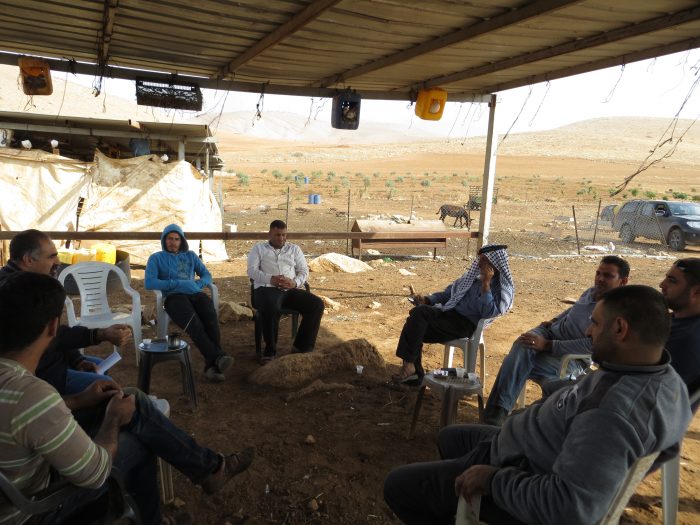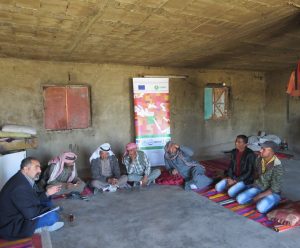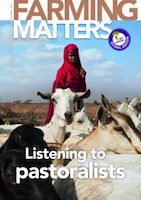Herders in Palestine face many challenges as a result of the occupation, fluctuating rainfall and a general lack of services. Supporting herders to increase their capacities to assert their rights has been an important step towards sustainable pastoralism.

Animal production constitutes 48 % of the total agricultural sector in Palestine. Just under half of the sector is made up from small ruminants, namely sheep and goats. But the reality of herders in Palestine, shaped by the occupation, is difficult. Fodder for their herds is not easy to come by as they cannot freely access the necessary inputs – land, water and seeds. Moreover, this is compounded by inadequate health services for their herds and a lack of marketing channels for their products.
In this context, since September 2013, Oxfam Italia has been implementing the Food Security Governance project, in partnership with the Palestinian Livestock Development Center in Tubas, the Union of Agricultural Work Committees in Gaza, and the Pales tinian Agricultural Cooperatives Union in Ramallah. Its activities were designed to support goat and sheep herders in the governorates of Jenin, Tubas, Nablus, Jericho, Jerusalem, Bethlehem, Hebron and Gaza, to improve their living standards and achieve food security. The project focused on supporting herders to increase their awareness of their rights and their ability to protect their property and manage their animals in a sustainable way given their resource constraints.
Challenges compounded

Due to the Israeli occupation, herders’ movements are severely restricted. They risk being deported if their land and pastoral areas are confiscated, or when military trainings take place. This applies to all municipalities and clusters, even though the risk varies between them depending on the distance from the settlements or from cities such as Jerusalem, Hebron and Bethlehem – where the threat to land confiscation is the highest. This situation contributes to overgrazing and the inability to access water. In combination with irregular rainfall patterns, and the lack of a comprehensive programme to manage the few remaining pastoral areas, the result is insufficient fodder throughout the year.Growing fodder crops is also frustrated by the climate, the lack of access to land as well as prohibitively expensive seeds due to high transportation costs, taxes and rising prices on the international market.
In terms of animal health, support from private and public institutions has not been sufficient. For herders, this is a constant concern, especially because of the high costs of drugs and veterinary services. Moreover, the Ministry is not able to provide the necessary vaccines against diseases such as brucellosis, Rift Valley fever and chlamydia. Finally, when animals are to be sold, herders face a lot of problems in terms of quality, security and distribution, leading to significant losses. They lack marketing channels and protection from imported products in the local markets. Moreover, the individual herders often lack the skills to improve the quality or add value to their products. It is thus not surprising that the number of families in Palestine whose livelihoods depend on raising sheep and goats declined significantly between 1990 and 2015. In this period, the number of female sheep and goats declined from 1.5 million to 730,000.
Recognising the communities’ needs
In discussions with all herders, the project field team analysed this general context and identified the communities’ needs. One important strategy that they decided to pursue was to set up local committees within each cluster so that local communities will be able to organise and play a more effective role in solving their problems and ensuring that the authorities recognise their situation. More than 75 commitees were formed, each of them made up of at least seven individuals from the cluster, including men and women of all ages. Two members from each committee act as focal points, representing their cluster in all meetings that take place outside their cluster.
As a first step to claim their rights in front of the most relevant decision makers and authorities, the focal points of all the pastoral clusters in each governorate met at the Governorate Committee, joined by representatives of the Agriculture Directorate, the local Government Directorate, and a representative of the local council of each cluster. Three main meetings were held. The first meeting took place in February 2014 and included cluster focal points from Jenin, Tubas and Nablus. The second was in April 2014, including cluster focal points from Jericho-Jerusalem. The third meeting was in June 2014, with the cluster focal points from Bethlehem– Hebron. In total, around 140 herders and an additional 60 representatives of the Ministry of Agriculture, the Ministry of Local Government, local councils, municipalities and some elders participated in these meetings.
Their best asset is their own community’s capacities and resources
After the meetings at the governorate level, the focal points looked at the best way to address their cluster’s problems. The main conclusion was that expecting aid from others is a short-term solution which, most often, does not meet the community’s needs. They were keenly aware that their best asset is their own community’s capacities and resources, and that increasing awareness of their rights would be paramount. The Alsahel Company, a specialised group based in Ramallah, trained the community representatives on how to build a problem tree, to systematically identify and tackle the problems of their cluster. They focused on local solutions considering the resources that were both available and accessible.
Greener pastures
One of the solutions that has been implemented is the regeneration of the remaining pastoral spaces. The herders cooperated with the Agriculture Directorates in each governorate, under the supervision of the Ministry of Agriculture, to do this. Their work has helped to reduce families’ production costs as healthier pastures naturally lead to more available fodder and healthier animals. A flow-on benefit has been that with healthier herds, the quality of their products has improved and this has opened up more marketing options.
All participants agree that all parties needed to join efforts – including the Ministry of Agriculture, the cooperatives and the civil society associations, all breeders and the international financing institutions. They need to prepare a medium-term plan for the sustainable exploitation of the available resources, and to work in a complementary manner. This is a sector that needs the attention of decision makers and specialists, providing guidance and support when needed and running awareness-raising campaigns among breeders, as the best way to ensure positive results and impact.
The most important elements, however, are the pastoralists themselves. The increased interest in self-reliance supports the notion that community participation is a way to ensure the continuous practice of pastoralism in the region. This understanding paved the way for other creative projects within each cluster. A real change occurred in the way the herders looked towards the future, as they started to rely on themselves to defend and develop their livelihoods.
Atef Mahmoud Mohammad Beni Odeh (azmouti1964@hotmail.com) is an agronomist specialised in animal productivity. He works for the Palestinian Livestock Development Center and is the project coordinator of the Food Security Governance project.

